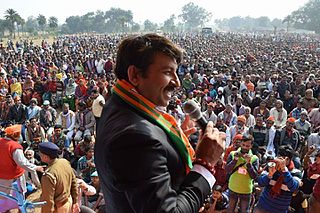A Quote by Manoj Tiwari
Everything in Delhi is messed up. People are forced to buy bottled water as clean drinking water is not available.
Related Quotes
Water is one of the most basic of all needs - we cannot live for more than a few days without it. And yet, most people take water for granted. We waste water needlessly and don't realize that clean water is a very limited resource. More than 1 billion people around the world have no access to safe, clean drinking water, and over 2.5 billion do not have adequate sanitation service. Over 2 million people die each year because of unsafe water - and most of them are children!
We buy a bottle of water in the city, where clean water comes out in its taps. You know, back in 1965, if someone said to the average person, 'You know in thirty years you are going to buy water in plastic bottles and pay more for that water than for gasoline?' Everybody would look at you like you're completely out of your mind.
We buy a bottle of water in the city, where clean water comes out in its taps. You know, back in 1965, if someone said to the average person, You know in thirty years you are going to buy water in plastic bottles and pay more for that water than for gasoline? Everybody would look at you like youre completely out of your mind.
Besides, the sense of safety offered by bottled water is a mirage. It turns out that breathing, not drinking, constitutes our main route of exposure to volatile pollutants in tap water, such as solvents, pesticides, and byproducts of water chlorination. As soon as the toilet is flushed or the faucet turned on-or the bathtub, the shower, the humidifier, the washing machine-these contaminants leave the water and enter the air. A recent study shows that the most efficient way of exposing yourself to chemical contaminants in tap water is to turn on a dishwasher.
































